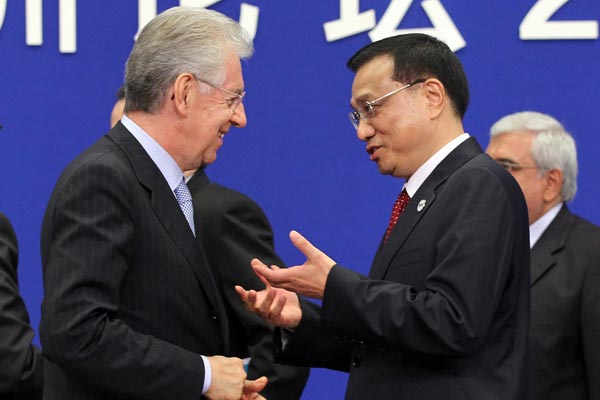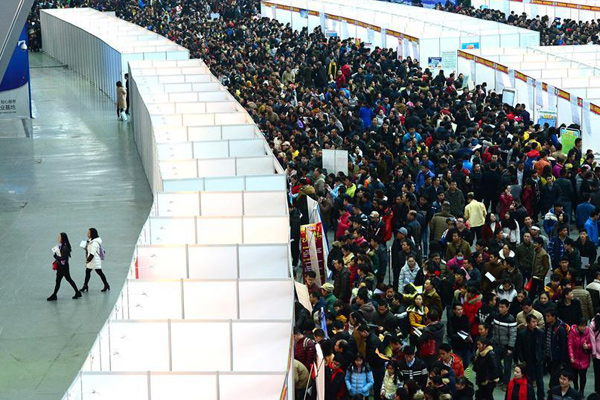

Vice-Premier Li Keqiang talks with Italian Prime Minister Mario Montl after the opening ceremony of the Boao Forum for Asia Annual Conference 2012 in Boao, Hainan province, on March 2,2012. [Photo/China Daily]

China will expand regional cooperation, vice-premier tells Boao Forum
Greater engagement with Asia will play a key strategic role in China's opening-up policy, Vice-Premier Li Keqiang said on Monday.
Promoting growth will provide sound and sustainable development for the region, Li said at the opening ceremony of the annual meeting of the Boao Forum for Asia.
As the largest market for Asian imports and an important source of investment, China will expand cooperation in a range of sectors, such as emerging industries, infrastructure, finance and technology, Li said.
"Openness has been vital to Asia's fast growth in the past and it will continue to be crucial for the area's further development," he said.
China will work with countries to push forward the establishment of regional cooperation mechanisms such as bilateral and multilateral free trade zones, Li said.
More than 2,000 officials, business and academic leaders from around the world attended the event with the theme of "Asia in the Changing World: Moving Toward Sound and Sustainable Development".
"The world has turned its spotlight on Asia against the backdrop of the lingering recession,'' Zhang Yansheng, director of the Institute for International Economic Research under the National Development and Reform Commission, told China Daily.
The tide of globalization has faded to some extent because of the recession, and regionalization has been more emphasized, he said.
This is highlighted by the fact that the world is paying more attention to emerging economies such as China and India, he said.
Setting up free trade areas with other Asian countries and optimizing the existing mechanisms should be a major focus for China, Zhang said.
China and other Asian countries share a sound basis of collaboration such as the cooperation channels between China and the Association of Southeast Asian Nations. Also, China is negotiating with the Republic of Korea and Japan to create a free trade area.
"These mechanisms are competing with each other but the winner will be the one that brings the most benefits to the area. The US-dominated Trans-Pacific Partnership might bring least benefit to Asian countries, as its key purpose is to gain a slice of the pie of the area's rapid growth," Zhang said.
In his speech, Vice-Premier Li also said that the country's fundamentals remain good and he is confident in its ability to maintain long-term, stable and relatively fast economic growth.
"The fundamentals of the Chinese economy remain good and the momentum of economic growth has not changed. We will be able to maintain steady and relatively fast development in the long term," he said.
PepsiCo chief executive officer Indra Nooyi, who is attending the forum, said the speech delivered a "very encouraging and clear" message.
It's very impressive that Li stressed China's desire to cooperate and that it wants a win-win scenario with other countries, she said.
Lu Ting, chief China economist of Bank of America Merrill Lynch, said he was cautiously optimistic about China's economic growth.
Rising labor and energy costs will slow down growth but it will still remain at 8.6 percent in 2012, Lu said.
In terms of economic balancing, Liu Mingkang, former chairman of China Banking Regulatory Commission, said China needs to change its growth model by expanding consumption and exploring development potential in smaller cities.
William Rhodes, senior adviser of Citigroup, said as the European Union's largest trading partner, the eurozone debt crisis would continue to have an impact on China's economy, but "even more important is China stimulating its domestic market", he said.
"Li's speech has demonstrated China's next key step, which is to prioritize deeper engagement with other Asian nations," said Qu Xing, director of the China Institute of International Studies.
Qu said both the EU and the US have encountered structural problems in their economies. In contrast, Asia has shown rather high resistance, Qu said.
Pang Zhongying, an international relations professor at Renmin University of China, said in a meeting linked to the forum that Li's speech suggests China has to respond to possible economic challenges.
Li mentioned that the Shanghai Cooperation Organization should work together on economic issues and emphasized collaboration among China, Japan and the Republic of Korea. This indicates China's new outlook on how to promote regional integration within Asia, Pang said.
China has entered a crucial stage in reforming the economy and will continue to strive to achieve breakthroughs in key areas, including taxes, finance, prices and income distribution, Li said.
Contact the writers at [email protected] and [email protected]
Wang Chenyan contributed to this story.
 Chicago Auto Show kicks off
Chicago Auto Show kicks off
 Job fairs held across China after Spring Festival
Job fairs held across China after Spring Festival
 A railway couple request 'leave' from their daughter to work
A railway couple request 'leave' from their daughter to work
 Villagers in Henan busy making lanterns to ensure market supply
Villagers in Henan busy making lanterns to ensure market supply
 Chinese business tycoons attend entrepreneur forum in Yabuli
Chinese business tycoons attend entrepreneur forum in Yabuli
 Biggest robot collection tracks 500-year history
Biggest robot collection tracks 500-year history
 Family visit lifts spirits of Spring Festival worker
Family visit lifts spirits of Spring Festival worker
 Tech companies offer bonuses to motivate employees after holiday
Tech companies offer bonuses to motivate employees after holiday
 Timeline of policy support for sports, outdoor activities and fitness
Timeline of policy support for sports, outdoor activities and fitness
 Things you need to konw about Davos 2017
Things you need to konw about Davos 2017